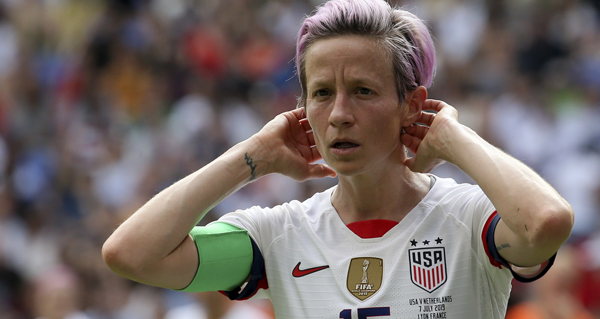Megan Rapinoe barely has time for the non-soccer stuff. The life of a professional athlete is dominated by work and the work-adjacent: training alone, training with teammates, breaking down tape, taking instruction from coaches, attending press events, watching your diet, traveling to games, optimizing your sleep cycle, etc. It’s an extraordinary grind and every player of a certain caliber needs a support system to take care of tasks they don’t have time or energy for. Nearly all of them have agents to handle contract talks and marketing opportunities. Teams employ PR flaks to navigate the media. Many players—the ones who can afford it, anyway—hire private chefs so they can eat well without spending an hour chopping veggies and sauteing the salmon themselves. The idea is that this infrastructure allows the athlete to focus on taking care of their bodies and preparing for the next opponent. Maybe they also get to hang out with their friends or spouse once in a while, if everything is running smoothly.
So it must be extremely frustrating when an organization that’s supposed to be a resource is also your adversary. That’s the relationship Rapinoe and her teammates have with the U.S. Soccer Federation, who have spent the better part of three years quarreling with their world champion players about how much money they deserve. If you’re reading this, you likely understand the basic push-pull: the USSF claims that the USWNT don’t deserve the same pay as their male counterparts because women’s soccer isn’t as much of a financial draw. (“Market realities” is a term they like to employ.) While that might be a valid argument in Spain or Germany, it’s not really true here in America, where the USWNT are a juggernaut and the USMNT couldn’t even qualify for the last World Cup. Last March, the USWNT filed a gender discrimination lawsuit against the USSF citing that USSF profits over the past few years are due largely to the fact that the USWNT attracts great attendance numbers and a large TV audience despite being paid relatively little compared to the men.
We could—if we had college degrees worth more than the paper they were printed on—play economist and figure out exactly what the USWNT deserve, but it’s clear to any reasonable observer that they’re significantly underpaid. To present the moral argument rather than mathematical one: isn’t the USSF’s job to promote and grow the sport in America? Wouldn’t it demonstrate how highly they value the women’s game if they gave the best team in the world in one category the same money they give the (what?) 25th-best team in another?
By not doing that—by, in fact, fighting tooth and nail to not do it—the USSF reveals itself to be much more like a private, money-making concern than a benevolent nonprofit that’s supposed to look after the welfare of American soccer and its most accomplished athletes. The federation’s mission statement—”[we seek] to make soccer, in all its forms, a preeminent sport in the United States and to continue the development of soccer at all recreational and competitive levels”—rings pretty damn hollow at the moment.
There’s a smugness to some American coverage of the broader soccer-playing world, because the dysfunction within the bodies that govern it often achieves a pitch of vain (and often peculiarly European) ridiculousness we’re not quite used to here. Like, for instance La Liga and RFEF (Spain’s national federation) are currently fighting over whether or not Liga matches should be played on Fridays and Mondays. Essentially, La Liga wants the increased TV revenue from Friday and Monday matches and RFEF has made the argument that non-weekend matches are poorly attended and serve as a kind of scheduling ghetto to which the league’s lesser lights are relegated. (You won’t catch Real Madrid playing on a Monday.) RFEF technically has jurisdiction over La Liga, so they unilaterally nixed the fixtures they didn’t like and La Liga immediately took them to court.
It’s impossible to get into the absurdity of the personalities involved with any kind of brevity—here is Liga prez Javier Tebas, looking like an owl who’s just had his sexual prowess impugned—but the silliest and most counterproductive aspect of this tiff is that it was happening until very recently: right up until two weeks before the start of the season. Broadcasters and thousands of fans had to put their plans on hold while bloviating sportocrats working 15-hour weeks waged the most boring kind of war. (Sidenote: La Liga currently has no UK broadcast partner. That’s a way more pressing issue than when a couple of games per week are played.) This inter-organizational bickering happens constantly in Spain, mostly because Tebas is an intractable ass but also because most of the people involved care a lot less about the actual soccer than they should. RFEF vs. La Liga is an unending battle of egos with a popular sport stuck in the middle. Anyway, the Primera’s playing on Fridays but not Mondays this year. A judge had to use his legal training to decide that.
Does the U.S. Women’s squabble with the USSF sound all that different to you? Other than that one side is obviously correct. The USSF is pulling some Euro-style nonsense. It seems like they’re being so obstinate in part because they simply don’t want to admit that they’re wrong, or they resent being told what to do by the players whose existence props up their own. The solution here is both simple and extremely unlikely: the USSF needs to understand that they serve the athletes, not the other way around. If they grasped that, which they surely don’t, this dispute would resolve itself amicably and Megan Rapinoe and company could go back to worrying about what matters. Instead, this will all continue on its combative and ludicrous course. All we can do is hope it ends well for the players, but it’s a shame that the journey has to be this difficult.



